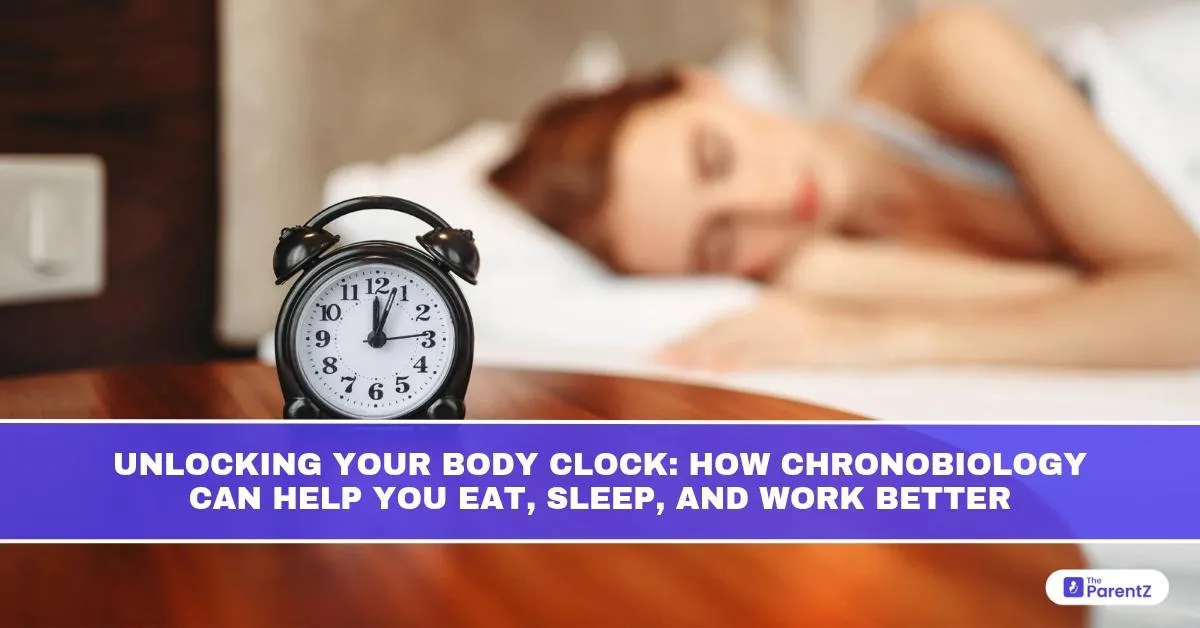Do you struggle with mid-day fatigue, poor sleep, or irregular digestion—despite trying to “eat right” and sleep 8 hours? The issue might not be your habits but your timing.
Chronobiology, the science of biological rhythms, explains how your body works on a 24-hour cycle known as the circadian rhythm. This rhythm affects your sleep-wake cycle, digestion, hormone release, and even mental focus.
By aligning your daily activities with your natural internal clock, you can improve your health, mood, energy, and efficiency without drastic lifestyle changes.
What is Chronobiology?
Chronobiology studies the body’s biological rhythms, especially the circadian rhythm, a 24-hour internal timer regulated by your brain and influenced by light, sleep, food, and movement.
Your main circadian clock is in the suprachiasmatic nucleus (SCN) of the brain. It controls several “peripheral clocks” present in the liver, pancreas, gut, muscles, and other organs. These clocks coordinate essential functions like metabolism, temperature, and hormone release.
When you live against your body’s rhythm, such as staying up late, skipping breakfast, or eating large meals at night, your internal clocks fall out of sync, affecting both your short-term energy and long-term health.
Why the Body Clock Matters
Your body performs different tasks better at certain times of the day. For example:
- Morning: Cortisol levels rise, boosting alertness. Body temperature and blood pressure increase.
- Afternoon: Reaction times peak. Coordination improves.
- Evening: Melatonin is released. Body prepares for rest.
When these rhythms are disrupted (e.g., by night shifts, late-night screen use, or irregular meals), it can result in:
- Sleep disturbances
- Weight gain or slowed metabolism
- Digestive issues like acidity or bloating
- Reduced concentration or brain fog
- Increased risk of chronic diseases like diabetes and heart conditions
How to Sync Your Life with Your Body Clock
1. Wake and Sleep at Consistent Times
Your body likes predictability. Waking and sleeping at the same time every day, even on weekends, keeps your circadian rhythm stable.
Ideal sleep window: 10 PM to 6 AM, when melatonin is highest and sleep is most restorative.
2. Get Morning Sunlight
Within 30–60 minutes of waking, step outside or near a window. Natural light signals your SCN to start the day, suppresses melatonin, and resets your clock.
Light exposure in the morning also improves serotonin production, enhancing mood.
3. Eat in Sync with Digestion Rhythms
- Breakfast: Ideal between 7–9 AM, when insulin sensitivity is highest.
- Lunch: The main meal, ideally 12–2 PM, when metabolism is most active.
- Dinner: Light and early (before 8 PM), to prevent late-night glucose spikes.
Avoid late-night eating, which disrupts glucose regulation and interferes with melatonin.
4. Exercise During Your Energy Peaks
- Morning: Light movement like yoga or walking to signal the start of your day
- Afternoon (4–6 PM): Best time for strength and cardio workouts as body temperature and muscle strength are optimal
5. Avoid Blue Light at Night
Screens emit blue light that delays melatonin release, keeping you alert when you should be winding down.
Use blue light filters or stop screen use 1–2 hours before bed. Opt for warm lighting and calming routines.
Chronobiology for Working Parents and Students
Busy schedules don’t have to sabotage your rhythms. Here’s how to align your routine:
| Time | Activity Recommendation |
| 6–7 AM | Wake up, sunlight exposure, light stretching |
| 8–9 AM | Protein-rich breakfast; avoid sugary foods |
| 9–12 Noon | Focused mental work, study, or meetings |
| 1–2 PM | Balanced lunch, short walk |
| 3–4 PM | Lighter tasks, admin work |
| 5–6 PM | Workout or outdoor play |
| 7–8 PM | Light dinner |
| 9–10 PM | Reading, relaxation, reduce lighting |
| 10–11 PM | Sleep |
What Science Says
Recent studies highlight the power of chronobiology:
- Harvard Medical School (2022): Eating meals out of sync with circadian rhythms increased insulin resistance and fat storage.
- Journal of Clinical Sleep Medicine (2023): Consistent sleep and wake times improved mood, focus, and metabolic health.
- Nature Reviews Endocrinology (2021): Circadian misalignment is a root cause in diseases like obesity, diabetes, and depression.
Final Thoughts
Your body is not a machine; it is a rhythm-driven system that works best in harmony with nature’s clock.
Chronobiology offers a gentle, science-backed approach to improve your health by aligning with your natural energy cycles. Instead of forcing your body to work at the wrong time, learn to flow with your biology.
Small steps, like early dinners, sunlight in the morning, or a consistent sleep schedule, can lead to big shifts in your sleep, energy, metabolism, and mood.
Because when you unlock your body clock, you unlock better living.





Be the first one to comment on this story.